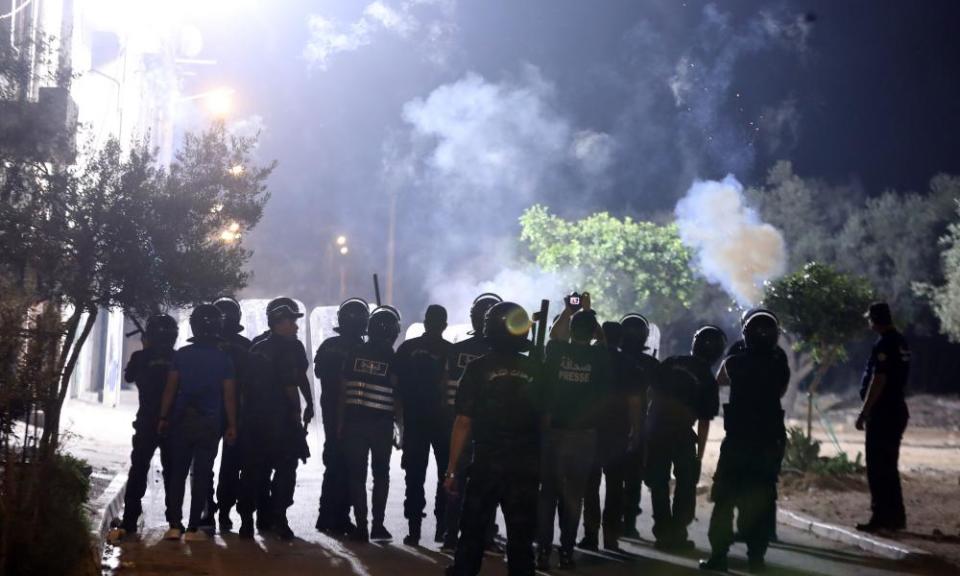Protests over police violence spread through Tunisian capital

Tunisia’s capital has been rocked by a week of protests against police violence that began after the death of a man in police custody and footage that went viral of officers stripping and beating another man.
Six nights of demonstrations that began in the working-class districts of Sidi Hassine and Séjoumi in Tunis spread to other neighbourhoods on Monday night.
According to police, 32-year-old Ahmed Ben Ammar died in custody on 8 June after apparently ingesting marijuana. His family have accused the police of beating him to death – an allegation denied by Tunisia’s interior ministry.
During protests against Ammar’s death on 9 June, police were filmed beating a young man, who cannot be named. Footage of the assault rapidly went viral and has caused a furore, prompting condemnation from politicians of all stripes.
Tunisia’s president, Kais Saied, visited Sidi Hassine on Friday, where he expressed his anger over what he described as “isolated incidents”. The interior ministry, which has responsibility for the police, has also said that any violations are perpetrated by individual officers and do not represent a systematic policy, and that it launched a programme to reform the security apparatus years ago.
However, rights groups, activists and people living in areas where protests are taking place say Tunisia’s police force is characterised by an endemic culture of violence that has not changed since the 2011 revolution that overthrew Zine al-Abidine Ben Ali’s repressive regime.
The protests have been taking place in mostly poor neighbourhoods of Tunis, where locals say good jobs are hard to come by.
“The police here are dogs,” said 33-year-old Mongi, who said he knew both the man who had died and the one who was beaten. “They’re different than they are in the richer areas. They’ve gotten worse since the revolution. Now they have less money, so they take it from the people,” he said, referring to an ad hoc system of arbitrary fines he accused the police of levying on those found selling alcohol or carrying marijuana.
Related: Lawyers protesting against police in Tunisia allegedly attacked by officers
A decade on from a revolution against poverty, injustice and a police state, Tunisia has made progress towards democracy but its economic problems have worsened, sparking repeated protests.
The security services and police are two of the few branches of the state untouched by reform. Instead, a number of unions have emerged that work to guarantee virtual impunity for any officer found guilty of assault or torture.
During protests in January, police arrested more than 2,000 people, most of them younger people from the poorer neighbourhoods of Tunis. Human rights organisations said that hundreds were subjected to ill treatment and torture.
On Monday, the UN human rights office in Tunisia said in a statement that it was concerned by “serious and repeated violations since the beginning of the year [that] reveal continuing dysfunctions within the internal security services”.
According to rights groups such as the World Organisation Against Torture (OMCT), union pressure has been exerted upon magistrates and lawyers involved in cases of alleged police abuse, and victims and witnesses have been threatened. Legal grievances launched in response to alleged transgressions are either ignored, or disappear within the bureaucracy of the state, rights groups say.
On the streets of Sidi Hassine, claims by the interior ministry that officers guilty of wrongdoing would be punished were met with derision. “Even if they kill someone, they will just be appointed elsewhere,” said a 25-year-old man. “We will not stop fighting until we get our rights.”
Hélène Legeay, the legal director for the Tunis office of the OMCT, said police “feel they can do anything they want”.
“There is regular, harsh police violence inflicted upon citizens every day. As far as I can see, it’s just getting worse.”

 Yahoo Finance
Yahoo Finance 